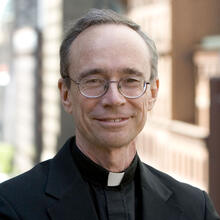(RNS) — This year’s U.S. presidential election is going to be of historic importance for both America and the world, and the Catholic Church in the United States is uniquely positioned to help foster nonpartisan conversation.
By Catholic Church, I do not mean just Catholic bishops. All Catholic citizens, and even ex-Catholics, can make a difference.
Catholics are important because there are lots of them. They are both Democrats and Republicans, and some of them are swing voters.
Catholics make up 21.4% of the U.S. population (12.6% are white Catholics, 8.6% Hispanic Catholics), according to the Public Religion Research Institute. Another 13% of adult Americans are ex-Catholics, according to the Pew Research Center. Altogether, that is about a third of the country.
By numbers alone, Catholics matter, but in addition many of them are in battleground states.
A majority of Catholics usually vote for the winner in presidential elections.
From 1928 to 1968, Catholics voted solidly Democratic in presidential elections, with perhaps one exception: Gallup says they voted Democratic in 1956, while the National Election Studies says they voted Republican.
The partisan divide among Catholics is a challenge and an opportunity for the church.
In 1972, a majority voted for the Republican candidate, Richard Nixon, and in the following few decades, they tended to vote Democratic but were not as reliable as they had been for the party of FDR and LBJ. Most importantly for election results, some Catholics could be counted among the swing voters who can determine the outcome of an election.
More recently Catholics have been split, with nearly equal shares going to each party. A deeper analysis finds that a majority of white Catholics identify as Republicans, while a majority of Hispanic Catholics are Democrats.
This is very different from white evangelical Christians, who are predominantly Republican, and Black Protestants and Jewish voters, who are predominantly Democratic.
The partisan divide among Catholics is a challenge and an opportunity for the church.
It is a challenge for Catholic preachers when their congregation is spit politically. What can they say without alienating half their congregation?
As a result, Catholic preachers avoid politics in their sermons. Only 41% of Catholics heard at least one sermon that mentioned the 2020 election, according to Pew, as compared with 71% of evangelical Protestants and 63% of Black church and mainline Protestants.
Although the partisan divide makes preaching difficult, it also provides an opportunity for the church to model proper civic behavior for the rest of the country.
Unlike white and Black church Protestant ministers, Catholic bishops and priests have traditionally not endorsed political candidates or parties. You might see them giving a prayer at a national convention, but not giving campaign speeches. (Full disclosure: My brother, who is a friend of the McCain family, said a prayer at the 2008 Republican Party convention.)
Protestant clergy could avoid a lot of problems if they followed the example of Catholic clergy by not endorsing candidates.
The Catholic bishops also have a document, “Faithful Citizenship,” which discusses issues and encourages political involvement and dialogue.
The combination of official nonpartisanship with a congregational mix of Democrats and Republicans could make Catholic churches a unique location for civic conversation.
The combination of official nonpartisanship with a congregational mix of Democrats and Republicans could make Catholic churches a unique location for civic conversation, where diatribes and hate speech are not allowed. The methodology of synodal conversation would work well to keep the temperature from boiling over into partisan rancor.
For this election especially, Catholics in the pews and in the hierarchy need to stick to facts and adhere to the values presented in “Faithful Citizenship.” The bishops should not retreat from their affirmation that the 2020 election results were legitimate and fair. They have no need to avoid issues like global warming, which have been raised by Pope Francis. How to respond to these issues is open to debate, but the moral obligation to support human rights, seek the common good and protect the planet is absolute.
The 2024 election will be crucial to the future of our country and the world. As citizens, Catholics must be part of the solution and not the problem.







